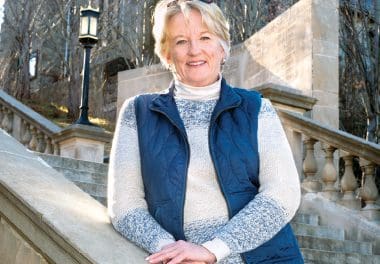Occupation / Formal Title: CEO, Patrick Henry Family Services
Hometown: Jellico, TN
Tell us a little about Patrick Henry Family Services. What is the mission of the nonprofit?
Patrick Henry Family Services has been serving distressed children and families in Virginia for 55 years. In order to meet those needs the organization has grown from what started as just a boys home into the five ministries we have today: Patrick Henry Boys and Girls Homes (residential care), Hope for Tomorrow Counseling (serving the communities of South Boston, Danville, Brookneal, Lynchburg, Farmville, Bedford and Richmond), Safe Families for Children (keeping children and families safe and cared for during time of temporary crisis), Hat Creek Camp (exciting outdoor adventure opportunities for children) and Straight Talk (an inspirational and uplifting daily radio broadcast and blog).
All of these programs work together to help keep children safe and families strong!
Our formal mission statement reads: “To meet the needs of every child before us, resulting in the maximum impact for that child, in the shortest time possible, in the most efficient way possible, always in a loving and professional manner.”
What is your history with nonprofits? How did you come to be the CEO of PHFS?
I have served in state agencies, private nonprofits, and local churches for 30 years, most of which have been in the area of child welfare and poverty. I came to PHFS in June 2010 from Goshen, IN, where I was serving as a major gift officer for Goshen College. That fundraising experience, along with my background in child welfare, helped me land my dream job.
2016 was a big year for you. Tell us about your new book.
The book is my childhood story of poverty, abuse, and neglect. Yet, it’s more than that; I wanted those who support PHFS to understand, on an emotional level, the work we do, and the significance it has in the lives of the children we serve. I also wanted the reader to understand how children and families get into the “hard places” that cause the pain and trauma. Every awful thing that happened to me as a child was preventable. So, why wasn’t it prevented? Every bad thing that is happening to kids today is even more preventable. Why is it still happening to them? I hope this book will serve as a catalyst, drawing more people into the work of rescuing vulnerable children and distressed families from those hard places. (100% of the proceeds from the sale of the book go to further the work at Patrick Henry Family Services.)
Another big achievement for you has been the Straight Talk radio broadcast… how is that going?
The one-minute segments are accomplishing what we hoped. The radio spots are raising the visibility of our organization and challenging the way people think and live. It’s not enough to serve the causalities of our culture, we must affect the way our culture thinks about certain things that impact the lives of children to really achieve change.
Do you think there are differences between being a leader of a nonprofit versus a for-profit business?
Many of the challenges are the same for both, and leadership is leadership, no matter where it is given. However, there is a big distinction between the two—the role of money. In business, money is the end means, the bottom line. In nonprofit, money is the means to an end. The bottom line is lives changed. In one, money is the master. In the other, money is the servant.
What are some of the biggest challenges nonprofits are facing across the board?
Nonprofits are notorious for confusing their model with their mission. They get stuck on a certain way of doing something instead of focusing on why they are doing it. Models change, methods have expiration dates—the mission does not. I think nonprofits that are unwilling to adapt to the quickly changing landscape will be left behind. With the exponential rate of change happening because of technology, nonprofits will have to be flexible, nimble, but stubborn as bull dogs when it comes to their mission.
What are your short term goals for PHFS?
Offer more services, in smarter ways, to more children and families.
Long term goals?
Continue to expand geographically to have a state-wide presence, in order to serve “every child before us.”
How would you define your leadership style?
More passion than smarts, but smart enough to know passion goes a long way.
What’s the best piece of advice you’ve ever received?
“Be who you is, cause if you is who you ain’t, you ain’t who you is.”
What one piece of advice would you share with others?
Change your thinking, and you will change your life.
What’s your history in the area?
Moved here in June 2010 and have enjoyed every day of it.
What’s life like outside of work?
I love my front porch, where I read, pray, and have great conversations with my family.
What do you enjoy the most about this region?
Being from Appalachia, I love the mountains. I also appreciate the history all around us. It helps me keep everything in proper perspective.
Closing thoughts?
All of my story, both past and present, reveals God’s amazing and endless grace…and how He uses our past for His purpose. I am honored and humbled to be able to work in the field about which I am so passionate.








